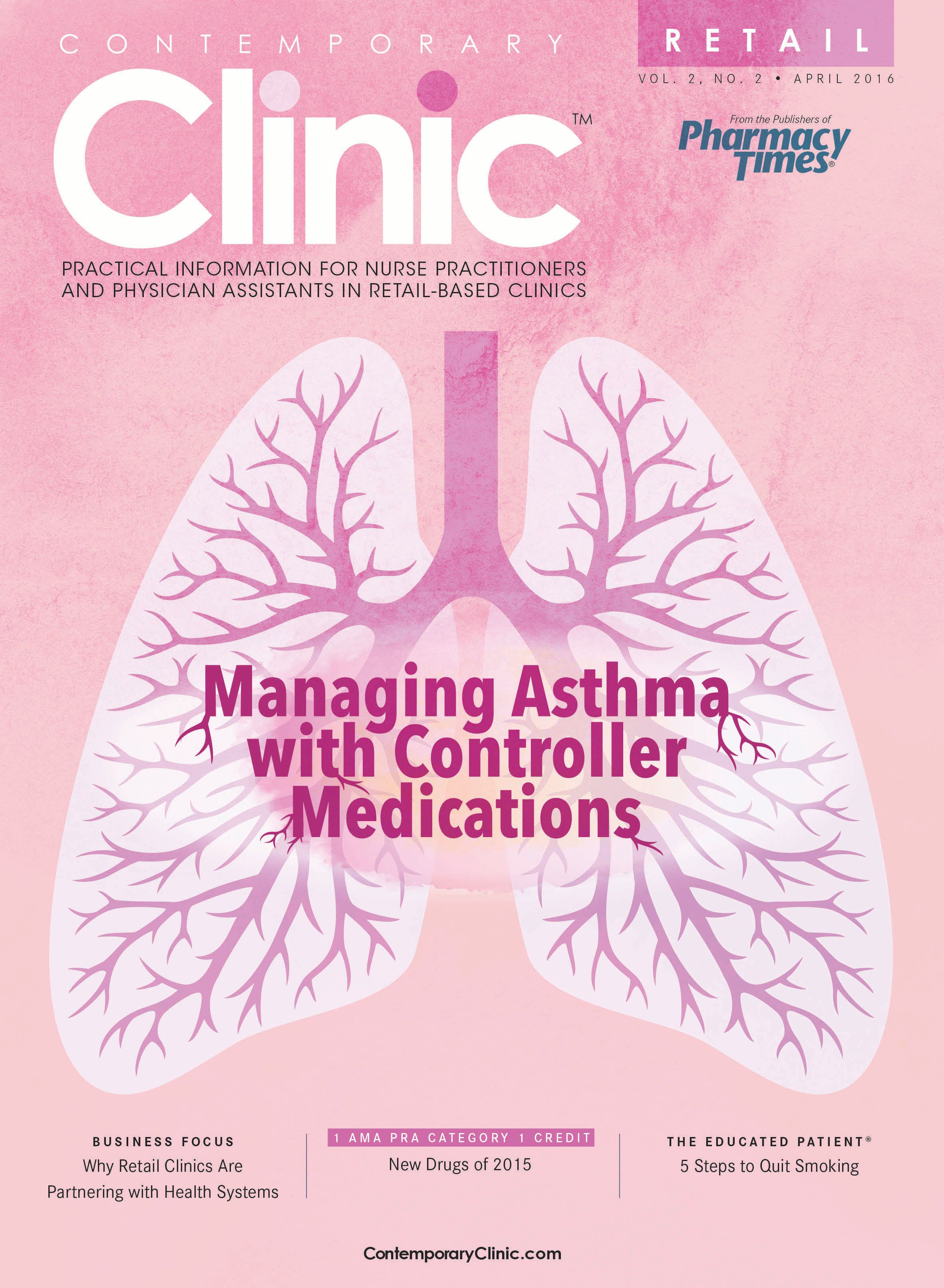Dietary Supplement Quality: The Meaning of the USP Verified Mark
With the availability of many different brands and types of dietary supplements, product selection can be daunting.
This article was sponsored by Nature Made Nutritional Products.
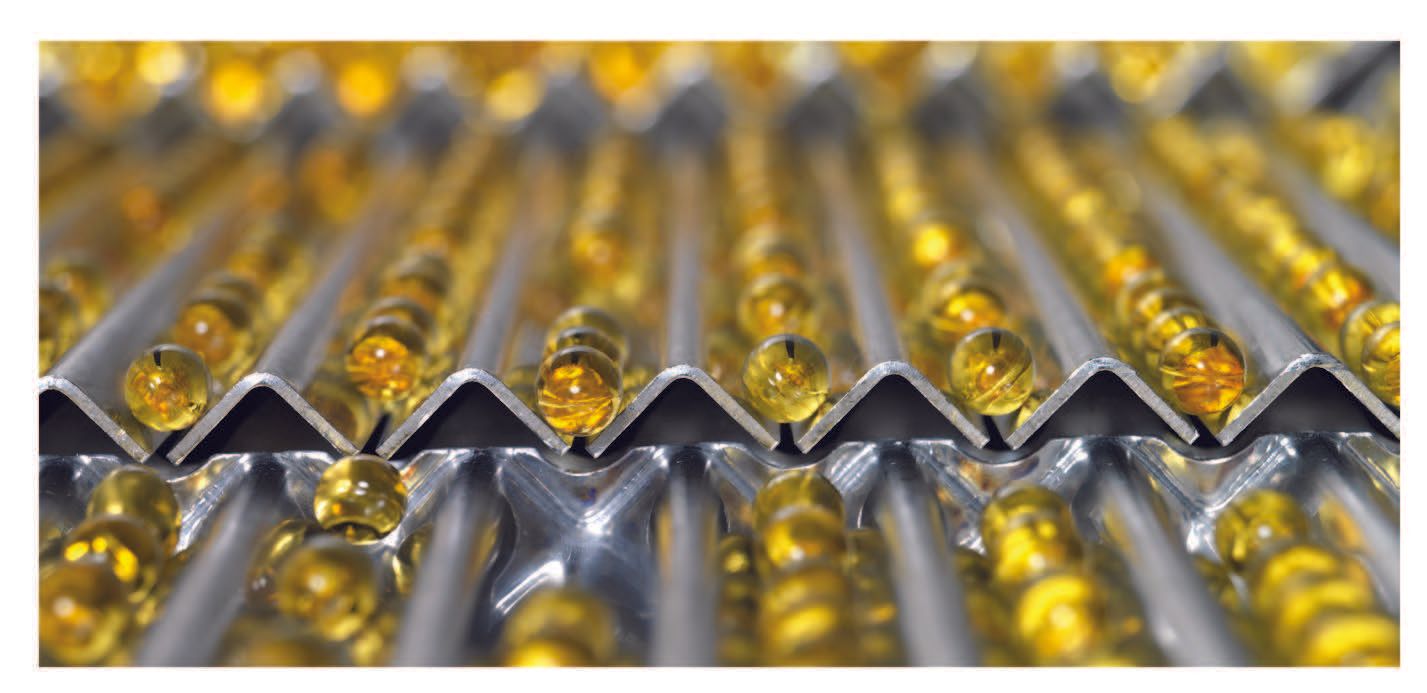
Each year, approximately 150 million Americans use dietary supplements, including vitamins, minerals, and botanicals.1With the availability of many different brands and types of dietary supplements, product selection can be daunting. Clinics are increasingly located in retail locations where dietary supplements are in close proximity, and consumers may turn to retail-based clinicians for advice regarding these supplements. Concerns regarding quality and safety issues in the dietary supplement industry may lead more consumers to ask questions about quality issues related to dietary supplements, making counseling consumers more challenging.2,3This article provides information regarding United States Pharmacopeial Convention (USP) standards in the context of dietary supplements, to help retail-based clinicians be more confident in making recommendations regarding these products.
FDA Regulations and USP
In 2007, the FDA issued its final rule on Current Good Manufacturing Practices (cGMPs) for dietary supplements in 21 CFR Part 111.1Under the cGMPs, manufacturers are required to establish their own quality standards for manufacturing processes, packaging, storage, and ingredient testing, and must properly document that these standards are being met. For example, the cGMPs stipulate that manufacturers must take all necessary precautions to prevent contamination. Manufacturers are also required to verify that their laboratory examination and testing methodologies are appropriate.4Although the cGMPs provide a framework for what constitutes compliance under these regulations, the FDA does not routinely test the products or provide the specific definitions of what is considered appropriate for a given product or process.4,5
Some manufacturers have taken steps to meet more stringent standards than what is required by the FDA’s cGMPs by voluntarily submitting products to rigorous testing by a third-party scientific authority, such as USP.6,7USP is a globally recognized, nongovernmental, science-based, nonprofit organization that sets standards for identity, strength, quality, and purity of medicines, food ingredients, and dietary supplements. USP publishes its standards in theUSP-NF, which is recognized by the Food, Drugs and Cosmetic Act as the official compendia of the United States (Section 201 [321] (j)).6-9
The USP Verified Mark
USP has been establishing quality standards for drugs since 1820 and thus is often associated with pharmaceutical products and ingredients. There may be less awareness among retail-based clinicians and consumers with regard to USP’s quality standards for dietary supplements and the rigor of the USP Dietary Supplement Verification Program (“DSVP”) that requires compliance to those standards. Dietary supplement products are awarded use of the “USP Verified” Mark on their label to indicate that USP has tested and verified that the product complies with USP public quality standards.6,10
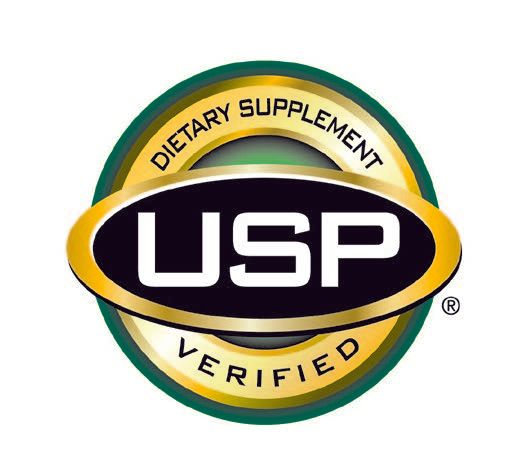
Before a dietary supplement is accepted into the DSVP, the USP scientific staff review the product formula to ensure that it does not contain any ingredients with known safety concerns. This initial screening helps to ensure that supplements containing ingredients with known safety concerns do not enter the DSVP.6,11To verify the quality of dietary supplements, USP staff conducts extensive on-site facility GMP audits of manufacturing operations, reviews product documentation, and tests product samples.
USP sets public quality standards that are product-specific and can be used by manufacturers to set product quality specifications as required by the FDA cGMP rule.6,10USP creates dietary supplement monographs that outline appropriate tests and analytical test methods to be used (eg, chromatography) and acceptance criteria for the test results. USP dietary supplement monographs contain detailed specifications for identification, potency, and purity, and acceptable limits of specified contaminants (eg, objectionable microorganisms or natural toxins).6,12Testing is performed to verify that dietary supplements contain the ingredients listed on the label, with the correct potency and amount of dietary ingredient, and that harmful levels of contaminants, such as heavy metals, pesticides, bacteria, and molds, are not present.6,7The DSVP provides additional safeguards for known issues with a given dietary supplement product. For instance, the supplement ginkgo biloba often contains ginkgolic acids that are known for their potential to cause allergic reactions, as these acids are structurally similar to urushiol—the sensitizing oil present in poison ivy leaves. The USP monograph for ginkgo biloba sets stringent, specific limits to prevent consumers from exposure to potentially dangerous levels of ginkgolic acids. Dietary supplements are also tested by USP staff for disintegration or dissolution to help ensure that the product will release the dietary ingredients in the body, which is necessary for proper absorption.6
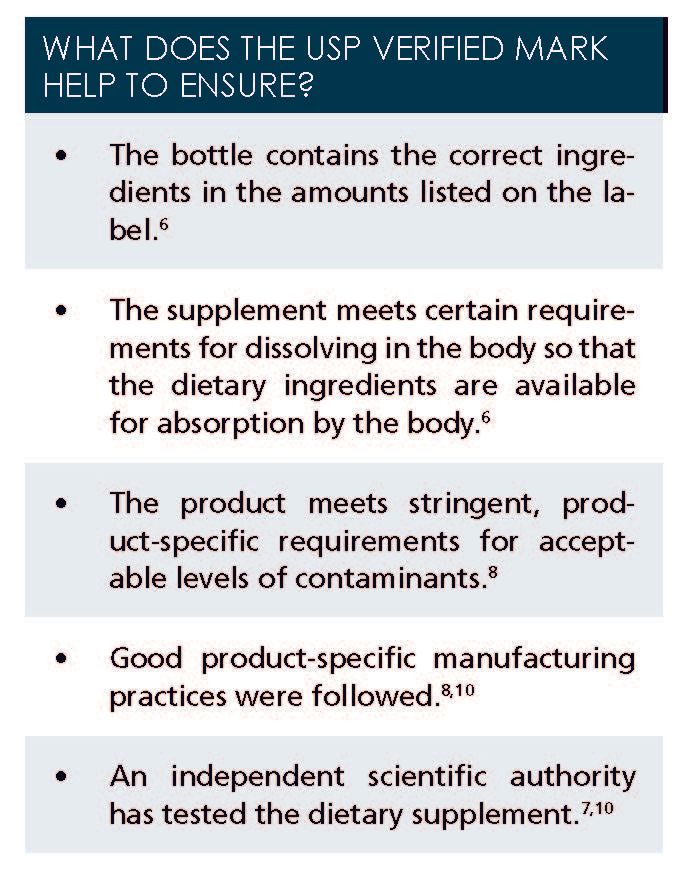
The DSVP program includes annual on-site GMP audits conducted by USP scientists who check for continued compliance with both the FDA’s cGMPs and the USP’s product-specific public quality standards. Finally, all dietary supplements awarded the USP Verified Mark are subject to annual post-market surveillance testing.8,10
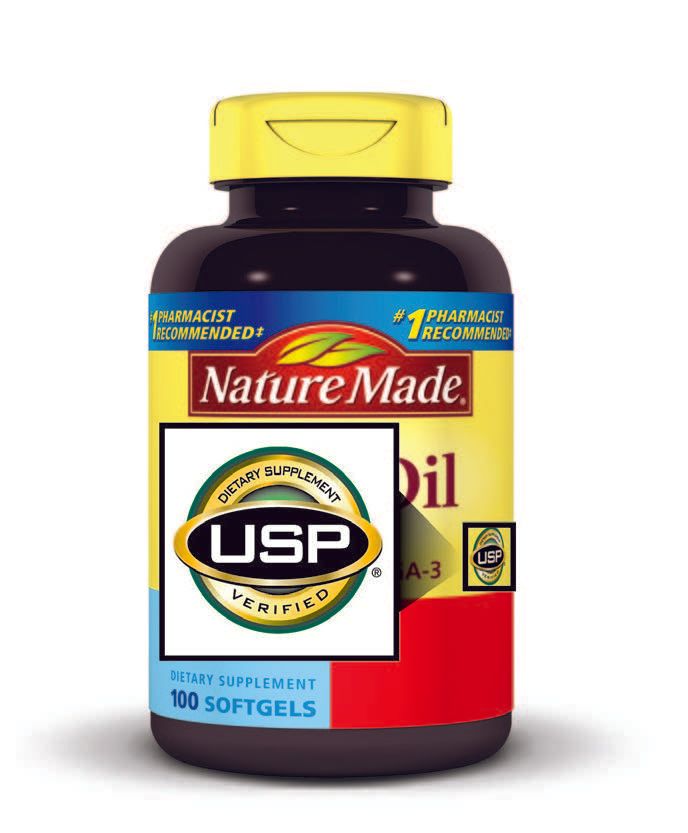
Opportunity for Retail-Based Clinicians
There is an opportunity for retail-based clinicians, as health care providers to whom consumers may turn with questions regarding dietary supplements, to become more knowledgable regarding USP quality standards, thereby increasing their confidence when making product recommendations. There are more than 100 USP-verified dietary supplement formulas, some of which are only available online. Nature Made®brand vitamins and supplements, commonly available in stores, account for 82 of the USP-verified formulas.13When consumers ask for guidance on choosing a trustworthy brand, retail-based clinicians can feel more confident in recommending products that have the USP Verified Mark because only these products are assured to meet the USP’s stringent
quality standards.6-8,10
Visit http://uspgo.to/ds-presentation for more informationon the Dietary Supplement Verification Program.
References
- Council for Responsible Nutrition. Dietary supplements: safe, beneficial and regulated. Council for Responsible Nutrition website. www.crnusa.org/CRNRegQandA.html. Accessed March 1, 2016.
- Newmaster SG, Grguric M, Shanmughanandhan D, Ramalingam S, Raqupathy S. DNA barcoding detects contamination and substitution in North American herbal products.BMC Med. 2013;11:222. doi: 10.1186/1741-7015-11-222.
- Gavura S. New concerns about the safety and quality of herbal supplements. Science-Based Medicine website. www.sciencebasedmedicine.org/new-concerns-about-the-safety-and-quality-of-herbal-supplements/. Published November 7, 2013. Accessed March 1, 2016.
- Title 21: Food and Drugs. Code of Federal Regulations. 2011;2(111):1-39.
- Richter SG. Dietary supplements—a new paradigm for manufacturers [white paper]. Microtest Laboratories, Inc; 2010.
- Srinivasan VS. Challenges and scientific issues in the standardization of botanicals and their preparations: United States Pharmacopeia’s dietary supplement verification program--a public health program.Life Sci. 2006;78(18):2039-2043.
- 2013 Annual Report. United States Pharmacopeial Convention website. www.usp.org/sites/default/files/usp_pdf/EN/aboutUSP/usp_2013_annual-report-update.pdf. Accessed March 1, 2016.
- Rapaka RS, Coates PM. Dietary supplements and related products: a brief summary.Life Sci. 2006;78(18):2026-2032.
- Sarma N, Giancaspro G, Venema J. Dietary supplements quality analysis tools from the United States Pharmacopeia [published online February 9, 2016].Drug Test Anal. doi: 10.1002/dta.1940.
- The regulation of dietary supplements: a review of consumer safeguards. 109th Congress, Second Session. US Government Publishing Office website. www.gpo.gov/fdsys/pkg/CHRG-109hhrg27187/pdf/CHRG-109hhrg27187.pdf. Accessed March 1, 2016.
- Gardiner P, Sarma DN, Low Dog T, et al. The state of dietary supplement adverse event reporting in the United States.Pharmacoepidemiol Drug Saf. 2008;17(10):962-970. doi: 10.1002/pds.1627.
- Schiff PL Jr, Srinivasan VS, Giancaspro GI, Roll DB, Salguero J, Sharaf MH. The development of USP botanical dietary supplement monographs, 1995-2005.J Nat Prod. 2006;69(3):464-472.
- USP verified dietary supplements. United States Pharmacopeial Convention website. www.usp.org/usp-verification-services/usp-verified-dietary-supplements/verified-supplements. Accessed March 1, 2016.
